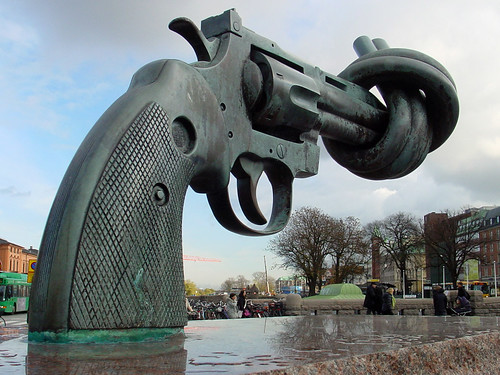- Francisco was driving from work that night, at 7:00 p.m., and he was waiting for the red light to turn green, when a man pointed at him with a weapon from outside the window. Francisco got off the car and handed him the keys, and the man took the car and leaved. Ten seconds later, he came back, in reverse, and he told Francisco: "You almost left with nothing. Where do you want me to shoot you?".
Francisco chose the hand, and he got it.
- Carlos was also driving from work, but he had just picked up his son from school when he was assaulted. That time, the delinquent told him:"The car is insured, that doesn't hurt you. I have to make you something that hurts you".
He shoot and killed his six-year old son.
- Jorge was eating our traditional fast food -an arepa with cheese- in an arepera, a friday night. He thought his arepa didn't have enough cheese, and demanded the boy who attended him, to give him more. "I can't", he said, "my boss will scold me".
So Jorge pulled a gun and shot at him.
- Laura is the women who cleans the office where I work. In four years, she has buried her three sons, shooted in different occasions in the barrio where she and her daughters still live. Mario, my boss's driver, also buried a son last december. None of them was over 21 years old.
The names are fictitious. But the stories, sadly, aren't.
I myself have been living in Valencia for seven years. During that time, I have had to see two dead bodies, lying in the street in a pool of blood: one time near my home and the other, near my work. Both times, it was daylight.
Right now, unsafety might be our biggest concern. Or water. I truly don't know. What I do know, is that 2,5% of deaths occasioned by interpersonal violence in the whole world occur in Venezuela. And that we are a country with only 28 million inhabitants.
Every 38 minutes, a venezuelan dies in a violent crime. Since 2005, there isn't an official figure, but it is calculated that only in 2008, there were over 14.500 homicides in Venezuela. According to international standards, it begins to be an issue when the violent deceases outnumber 12 for every 100 thousand inhabitants. We have 56.
From those 14 thousand deceased, (at least) 231 died in hands of State security bodies. 65.85% of those, by "execution". Police seems to think it's easier to kill a delinquent than to make him/she be judged.
It is calculated that in Venezuela (a country, again, with 28 million inhabitants) there are 12 million of illegal weapons in hand of civil population. Violence, weapons and murder have become an everyday thing, so that when one gets mugged, the common, agreed, natural response is "at least I didn't got killed". However, our Minister for Interior Relationships, Tarek El Aissami, has declared that "though we're lowering the criminality index, and with that, the number of crimes, the media, irresponsably, have placed into public opinion a sensation that we are practically to fate of crime".
What experts say, and I, who am not an expert, agree, is that the problem is violence has now become a part of society. Our society has became an explosive cocktail of factors for crime: It has became "normal" to have an illegal weapon (even when insecurity itself has become an excuse for that); our society is know for its high consumption of alcoholic beverages; there is a high (and raising) rate of insatisfaction, aggresivity and hate.
I didn't know in which category to place this article, until I realized that the WHO says interpersonal violence is a matter of health. Not only deaths by violence, but violence itself: it generates a human, social, economic cost that is carried by both governments and society.
The World Health Organization has published nine recommendations to prevent violence, in their World Report on Violence and Health. Most of those recommendations are directed to governments, who have the biggest responsibilities in the prevention and treatment of violence. But civil organisations also have developed cooperation programs that, according to WHO, have had success. Some of the points an NGO can tackle are:
- Sensitise the public about the level of violence in society, and its consequences;
- Persuade people that they can do something against violence, individually and as members of the community;
- Promote better parenting, the use of role models and better communication and relationships between parents and children.
- Create campaigns to raise public awareness of the importance of prevention of violence;
- Help to collect and publish reliable data on violence and local and national crime;
- Organize regional seminars and workshops in violence prevention,
- Work with the media;
- Collaborate with ministries, municipalities and other national and local officials;

No comments:
Post a Comment